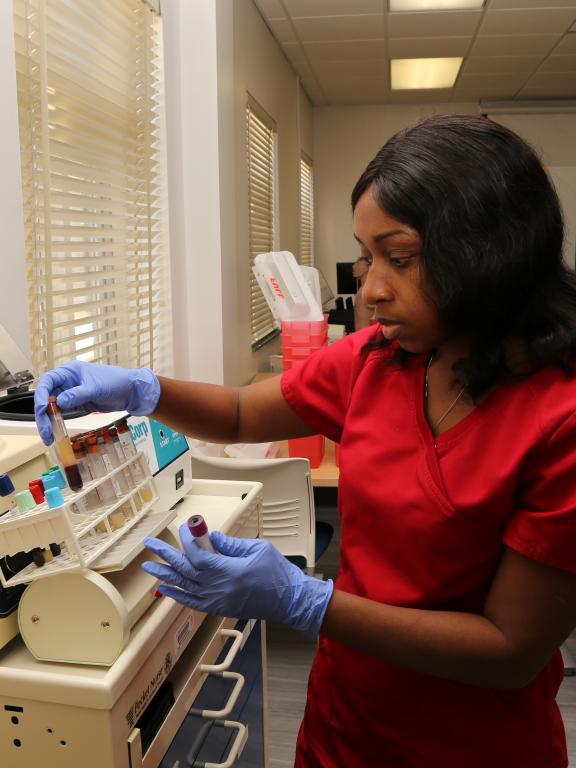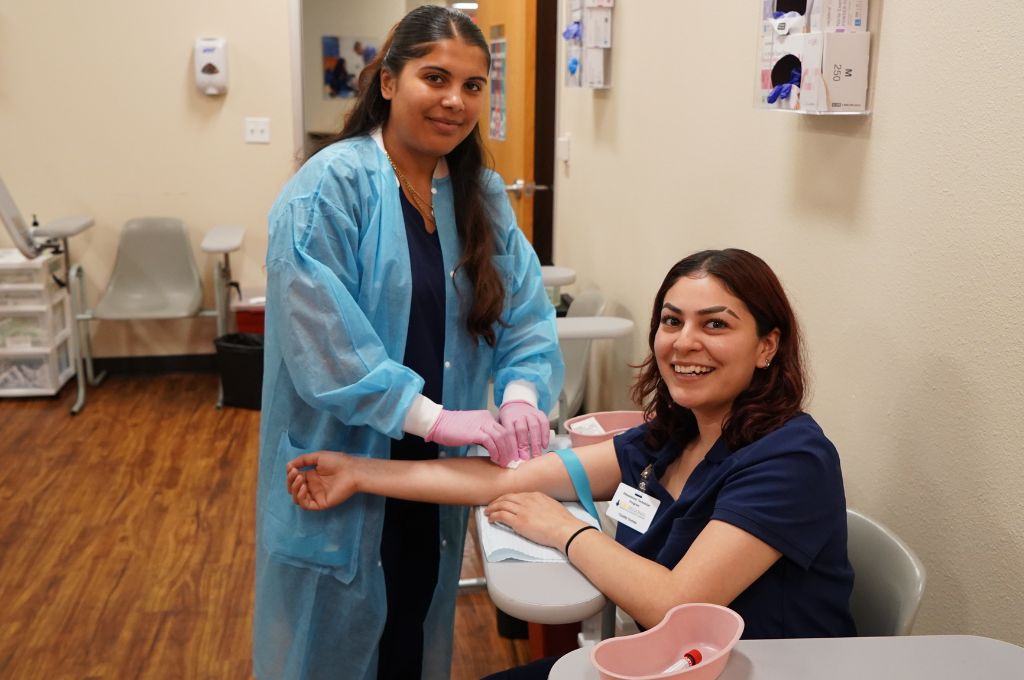Your Essential Plan to Starting Phlebotomy school With Confidence
Wiki Article
The Course to Certification: Comprehending the Phlebotomy Training Program Trip and Its Value
As you think about the path to certification in phlebotomy, it's important to recognize the duty you'll play in health care. Your training will cover important skills, from blood collection strategies to patient communication.
The Role of Phlebotomists in Medical Care
Phlebotomists play a necessary role in the healthcare system, working as the essential link between clients and essential analysis testing. You'll do blood draws, making sure samples are gathered properly and safely. Your proficiency assists in diagnosing medical problems, monitoring health and wellness, and guiding treatment choices.In your day-to-day interactions, you'll require to develop count on with individuals, making them really feel comfortable during what may be a stressful experience. You are in charge of classifying and dealing with examples meticulously to avoid contamination or mistakes, which can affect test results.
Beyond this, you'll typically function together with physicians and registered nurses, connecting essential information about patients' conditions. By mastering your skills, you contribute meaningfully to patient care, making you an essential part of the medical group.
Review of Phlebotomy Training Programs
When discovering phlebotomy training programs, you'll locate numerous kinds developed to fit different schedules and learning designs. Each program aids you establish necessary abilities like blood collection and client interaction. Understanding these choices is key to choosing the best path for your profession.Types of Training Programs
Several kinds of training programs are readily available for those looking to come to be proficient in phlebotomy. You can pick from certificate programs, which usually last a few months and concentrate on essential skills. There are also diploma programs that supply a more extensive education, frequently lasting up to a year. If you're looking for a much deeper understanding, an associate level in an associated field might be the appropriate fit. On-line programs provide flexibility for those balancing work or household commitments, enabling you to examine at your very own speed. Additionally, some hospitals and facilities provide on-the-job training programs, providing sensible experience while you learn. Whatever course you select, each program intends to equip you with the needed abilities for an effective phlebotomy career.
Secret Abilities Created
Understanding phlebotomy calls for a collection of vital abilities that are created via comprehensive training programs. You'll learn technical skills like proper vein option, needle insertion, and blood collection strategies. These hands-on techniques assure you can execute treatments securely and effectively. Furthermore, communication skills are fundamental; you'll need to interact with clients, discuss procedures, and placed them secure. Recognizing makeup and physiology is essential, also, as it assists you locate veins and understand the body's response to blood attracts. Ultimately, you'll gain expertise of security methods and infection control, ensuring you preserve a clean and sterile setting. Each of these skills is important for your success as a certified phlebotomist, making you a valuable property in any kind of health care setting.Secret Components of a Phlebotomy Program
In a phlebotomy training course, you'll concentrate on important subjects that lay the groundwork for your future job. You'll participate in hands-on training that enables you to use what you've found out in real-world settings. Both the core educational program and useful experience are essential for your success as a phlebotomist.Core Curriculum Introduction
While pursuing a phlebotomy training course, you'll encounter a core curriculum created to equip you with essential abilities and expertise. Phlebotomy Courses Near Me. This curriculum usually consists of composition and physiology, concentrating on the blood circulation system and understanding blood components. You'll also discover around various kinds of blood collection approaches, consisting of venipuncture and capillary puncture techniquesFurthermore, infection control and security procedures are crucial components, ensuring you know exactly how to preserve a sterilized setting. You'll study patient interaction, emphasizing communication and empathy, which are essential for easing patient anxiety. Ethical and lawful considerations will be addressed, preparing you for real-world responsibilities. This foundational understanding will enable you to excel as a phlebotomist and offer quality care in clinical setups.
Hands-On Training Experience
Obtaining hands-on experience is a crucial component of your phlebotomy training course. This sensible training enables you to apply what you have actually learned in a real-world setting, boosting your skills and self-confidence. You'll exercise venipuncture methods, find out exactly how to handle various types of samplings, and get knowledgeable about the devices used in the area. Under the guidance of seasoned trainers, you'll refine your skills, guaranteeing you're gotten ready for any circumstance you might deal with.Furthermore, you'll obtain the chance to engage with clients, which is crucial for establishing your interaction skills. This mix of technical efficiency and social skills is essential for your success as a certified phlebotomist. Inevitably, hands-on training is where theory satisfies technique, solidifying your understanding and preparedness for certification.
Accreditation and Licensing Needs
Before you can begin your career in phlebotomy, it is important to recognize the certification and licensing demands that differ by state. Most states need phlebotomists to hold a qualification from a recognized company, such as the National Phlebotomy Organization or the American Culture for Clinical Pathology. These certifications normally entail passing an exam that checks your expertise and abilities in the field.In addition to qualification, some states have specific licensing needs. You may need to complete a specific number of hours in scientific technique, send evidence of training, or undergo a background check. It is crucial to investigate your state's regulations to see to it you satisfy all essential standards.
Remaining notified concerning these needs not just aids you safeguard a placement however likewise improves your integrity as an expert. By satisfying these needs, you'll be well on your way to an effective job in phlebotomy.
Hands-On Training and Practical Experience
Hands-on training and sensible experience are important components of your phlebotomy education, as they permit you to use academic expertise in real-world circumstances. During your training, you'll participate in monitored venipuncture, discover proper techniques, and become knowledgeable about different blood collection equipment. This straight involvement is crucial for building your self-confidence and developing your skills.You'll function very closely with knowledgeable experts who can guide you via the nuances of patient communication and example handling. Each method session not only enhances your understanding yet likewise prepares you for the busy atmosphere of medical care settings.
In addition, several programs include scientific rotations, allowing you to experience varied settings, from medical facilities to outpatient clinics. This direct exposure assists you adjust to different obstacles and individual needs, guaranteeing you're well-prepared for your future role. Welcome these opportunities, as they're important to coming to be a proficient and thoughtful phlebotomist.
Difficulties Faced During Training
While obtaining hands-on experience is important, it's vital to recognize the difficulties that can arise during your phlebotomy training. You may encounter anxiousness when carrying out procedures on actual patients, especially if you're new to the setting. The stress to obtain everything right can be overwhelming. Furthermore, grasping the abilities required for blood attracts takes technique; you may have problem with technique at first.Time monitoring can additionally be a difficulty, as harmonizing concept, sensible sessions, and individual dedications can really feel daunting. You might deal with varying discovering speeds among your peers, resulting in feelings of self-doubt if you Phlebotomy Courses Near Me assume you're dropping behind. Ultimately, adjusting to the various characters of trainers can be difficult, as each may have a distinct teaching design.
Recognizing these barriers beforehand can prepare you for success and aid you establish resilience throughout your training trip.
Occupation Opportunities After Accreditation

As you gain experience, you may also take into consideration specializing in locations like pediatric or geriatric phlebotomy, satisfying certain person requirements. Some phlebotomists choose to advance their jobs by ending up being research laboratory specialists or going after more education in medical care fields.
Furthermore, your qualification can result in duties in training or monitoring brand-new phlebotomists, permitting you to share your knowledge. With the health care sector constantly expanding, your abilities will certainly always remain in demand, leading the way for a steady and meeting career. Embrace the chances waiting on you!
Often Asked Concerns
What Is the Regular Period of a Phlebotomy Educating Course?
Phlebotomy training courses generally last around four to eight weeks. You'll engage in hands-on method, class direction, and on-line understanding. Finishing this training prepares you for qualification and a fulfilling job in medical care.Are Online Phlebotomy Courses Available?
Yes, on-line phlebotomy courses are readily available. They supply adaptability and ease, permitting you to research at your very own speed. Just verify the program is certified to meet certification requirements and gain valuable abilities for your job.Just How Much Does Phlebotomy Training Commonly Price?
Phlebotomy training commonly sets you back between $700 and $2,500, depending upon the program and location. You should consider variables like training course size, included materials, and hands-on experience when picking the ideal training for you.What Are Typical Prerequisites for Phlebotomy Training?
Typical prerequisites for phlebotomy training usually include a secondary school diploma or GED, booster shots, and a background check. Some programs might also call for basic medical care knowledge or qualifications, ensuring you're planned for hands-on training.Can I Work While Finishing My Phlebotomy Training?
Yes, you can function while completing your phlebotomy training. Several trainees equilibrium tasks with their researches, but ensure to handle your time efficiently to assure you meet both work and training dedications successfully.Report this wiki page